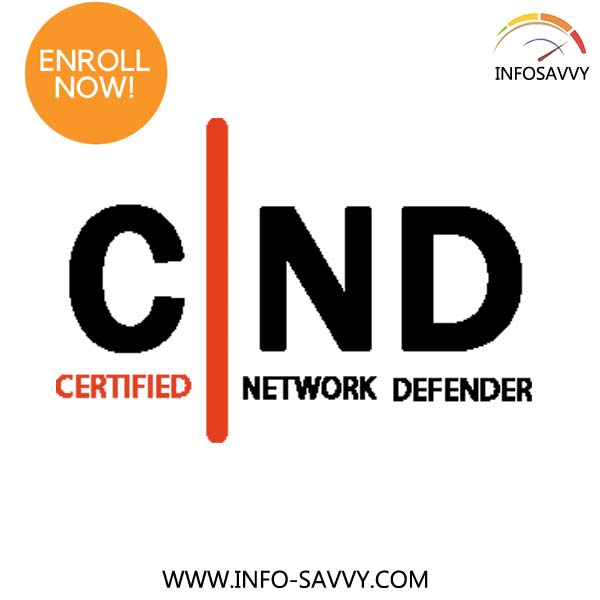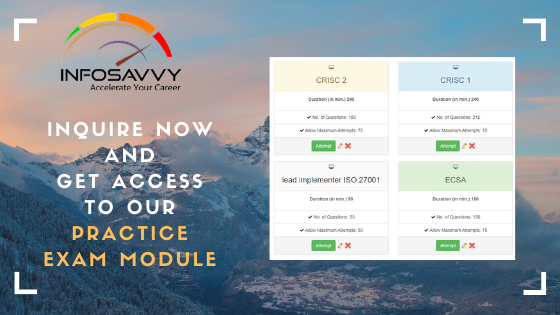Certified Network Defender (CND ) is a vendor-neutral, hands-on, instructor-led comprehensive network security certification training program. It is a skills-based, lab intensive program based on a job-task analysis and cybersecurity education framework presented by the National Initiative of Cybersecurity Education (NICE). The course has also been mapped to global job roles and responsibilities and the Department of Defense (DoD) job roles for system/network administrators. The course is designed and developed after extensive market research and surveys. The program prepares network administrators on network security technologies and operations to attain Defensein- Depth network security preparedness. It covers the protect, detect and respond approach to network security. The course contains hands-on labs, based on major network security tools and techniques which will provide network administrators real world expertise on current network security technologies and operations. The study-kit provides you with over 10 GB of network security best practices, assessments and protection tools. The kit also contains
templates for various network policies and a large number of white papers for additional learning.
Certified Network Defender (CND)
- Overview
- Course Outline
- Benefit
- Who Should Attend
- Exam Information
- Video Reviews
- Description
- Reviews (0)
- Computer Network and Defense Fundamentals
- Network Security Threats, Vulnerabilities, and Attacks
- Network Security Controls, Protocols, and Devices
- Network Security Policy Design and Implementation
- Physical Security
- Host Security
- Secure Firewall Configuration and Management
- Secure IDS Configuration and Management
- Secure VPN Configuration and Management
- Wireless Network Defense
- Network Traffic Monitoring and Analysis
- Network Risk and Vulnerability Management
- Data Backup and Recovery
- Network Incident Response and Management
- Student will learn about various network security controls, protocols, and devices
- Students will able to troubleshoot their network for various network problems
- Student will able identify various threats on organization network
- Student will learn how to design and implement various security policies for their organizations
- Student will learn the importance of physical security and able to determine and implement various physical security controls for their organizations
- Student will able to harden security of various hosts individually in the organization’s network
- Student will able to choose appropriate firewall solution, topology, and configurations to harden security through firewall
- Students will able to implement secure VPN implementation for their organization
- Student will able identify various threats to wireless network and learn how to mitigate them
- Student will able to perform risk assessment, vulnerability assessment/scanning through various scanning tools and generate detailed reports on it
- Network Administrators
- Network security Administrators
- Network Security Engineer
- Network Defense Technicians
- CND Analyst
- Security Analyst
- Security Operator
- Anyone who involves in network operations
Exam title: Certified Network Defender (CND)
Exam code: 312-38
Number of questions: 100
Duration: 4 Hours
Availability: ECCExam
Test Format: Interactive Multiple Choice Questions
Pass Criteria:- The actual cut score (the number of items you need to answer correctly) is based on input from a group of subject-matter experts who review the difficulty of the questions in relation to the expected skills of the target audience. As a result, the number of items that you have to answer correctly varies depending on the difficulty of the questions delivered when you take the exam. This ensures that regardless of which combination of items you see, the evaluation of skills is fair. If you see a more difficult set of questions, the number of correct answers needed to pass is less than if you see an easier set of questions. As a result, providing a simple percent correct wouldn’t provide useful information to someone who had to take the exam multiple times and saw different combinations of questions with different levels of difficulty.
Because the number of correct answers needed to pass varies based on the difficulty of the questions delivered, if you see a difficult combination of questions, your performance may actually be higher in relation to the passing standard even though you answered fewer questions (in other words, a lower percentage) correctly than if you saw an easier set of questions. Scaled scores simplify your ability to evaluate improvements in your performance over time. This is a standard practice across the certification and licensure industry.
Check out what our students have to say
CSCOrganizational focus on cyber defense is more important than ever as cyber breaches have a far greater financial impact and can cause broad reputation damage. Despite best efforts to prevent breaches, many organizations are still being compromised. Therefore organizations must have, as part of their defense mechanisms, trained network engineers who are focused on protecting, detecting, and responding to the threats on their networks. Network administrators spends a lot of time with network environments, and are familiar with network components, traffic, performance and utilization, network topology, location of each system, security policy, etc. So, organizations can be much better in defending themselves from vicious attacks if the IT and network administrators equipped with adequate network security skills .Thus Network administrator can play a significant role in network defense and become first line of defense for any organizations.
Exam title: Certified Network Defender (CND)
Exam code: 312-38
Course Duration: 5 days
Batch: Weekdays and Weekends
Time: 9.00 AM to 5.00 PM
Certified Network Defender (CND ) is a vendor-neutral, hands-on, instructor-led comprehensive network security certification training program. It is a skills-based, lab intensive program based on a job-task analysis and cyber security education framework presented by the National Initiative of Cyber security Education (NICE). The course has also been mapped to global job roles and responsibilities and the Department of Defense (DoD) job roles for system/network administrators. The course is designed and developed after extensive market research and surveys. The program prepares network administrators on network security technologies and operations to attain Defense in- Depth network security preparedness. It covers the protect, detect and respond approach to network security. The course contains hands-on labs, based on major network security tools and techniques which will provide network administrators real world expertise on current network security technologies and operations. The study-kit provides you with over 10 GB of network security best practices, assessments and protection tools. The kit also contains
templates for various network policies and a large number of white papers for additional learning.
- Computer Network and Defense Fundamentals
- Network Security Threats, Vulnerabilities, and Attacks
- Network Security Controls, Protocols, and Devices
- Network Security Policy Design and Implementation
- Physical Security
- Host Security
- Secure Firewall Configuration and Management
- Secure IDS Configuration and Management
- Secure VPN Configuration and Management
- Wireless Network Defense
- Network Traffic Monitoring and Analysis
- Network Risk and Vulnerability Management
- Data Backup and Recovery
- Network Incident Response and Management
- Student will learn about various network security controls, protocols, and devices
- Students will able to troubleshoot their network for various network problems
- Student will able identify various threats on organization network
- Student will learn how to design and implement various security policies for their organizations
- Student will learn the importance of physical security and able to determine and implement various physical security controls for their organizations
- Student will able to harden security of various hosts individually in the organization’s network
- Student will able to choose appropriate firewall solution, topology, and configurations to harden security through firewall
- Students will able to implement secure VPN implementation for their organization
- Student will able identify various threats to wireless network and learn how to mitigate them
- Student will able to perform risk assessment, vulnerability assessment/scanning through various scanning tools and generate detailed reports on it
- Network Administrators
- Network security Administrators
- Network Security Engineer
- Network Defense Technicians
- CND Analyst
- Security Analyst
- Security Operator
- Anyone who involves in network operationExam title: Certified Network Defender (CND)Exam code: 312-38Number of questions: 100Duration: 4 HoursAvailability: ECCExamTest Format: Interactive Multiple Choice Questions
Pass Criteria:- The actual cut score (the number of items you need to answer correctly) is based on input from a group of subject-matter experts who review the difficulty of the questions in relation to the expected skills of the target audience. As a result, the number of items that you have to answer correctly varies depending on the difficulty of the questions delivered when you take the exam. This ensures that regardless of which combination of items you see, the evaluation of skills is fair. If you see a more difficult set of questions, the number of correct answers needed to pass is less than if you see an easier set of questions. As a result, providing a simple percent correct wouldn’t provide useful information to someone who had to take the exam multiple times and saw different combinations of questions with different levels of difficulty.
Because the number of correct answers needed to pass varies based on the difficulty of the questions delivered, if you see a difficult combination of questions, your performance may actually be higher in relation to the passing standard even though you answered fewer questions (in other words, a lower percentage) correctly than if you saw an easier set of questions. Scaled scores simplify your ability to evaluate improvements in your performance over time. This is a standard practice across the certification and license industry.
You must be logged in to post a review.
You may also like…
-
IT Security & Governance
Certified Application Security Engineer | CASE .Net
Original price was: ₹22,000.00.₹20,000.00Current price is: ₹20,000.00. Add to cartThe CASE certified training program is developed concurrently to prepare software professionals with the necessary capabilities that are expected by employers and academia globally.It is designed to be a hands-on, comprehensive application security course that will help software professionals create secure applications.
[ninja_form id=7]
The training program encompasses security activities involved in all phases of the Software Development Lifecycle (SDLC): planning, creating, testing, and deploying an application. -
IT Security & Governance
Certified Application Security Engineer | CASE Java
₹20,000.00 Add to cartCertified Application Security Engineer | CASE Java focuses on secure application software development processes. It is a, hands-on, comprehensive application security course that will help you create a secure application software. This course encompasses security activities involved in all phases of the Secure Software Development Lifecycle (SDLC): planning, creating, testing, and deploying an application.
Unlike other application security training’s, CASE goes beyond just the guidelines on secure coding practices to include secure requirement gathering, robust application design, and handling security issues in post development phases of application development.[ninja_form id=7]
-
Cyber security
Certified Ethical Hacker Online Training – EC-Council
Original price was: ₹35,000.00.₹32,000.00Current price is: ₹32,000.00. Add to cartInfosavvy raises the bar again for certification and training of ethical hacking programs with the all new C|EH v10! This program will make you involve deeply into Hacker Mindset which will teach you how to think like a hacker, it puts you in a position where you have all the commands and knowledge in employing the ethical hacking process.
[ninja_form id=7]











Reviews
There are no reviews yet.